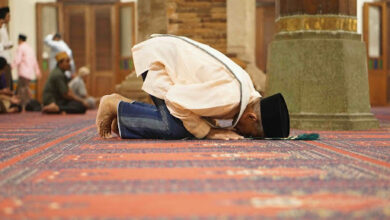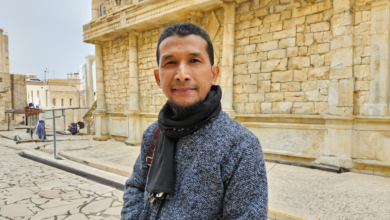
 Rawatib Sunat Prayer
Rawatib Sunat Prayer
The two rak'ah sunah prayers are performed before (qabliyah) and after (ba'diyah) the obligatory prayers, namely before Fajr, before and after Duhur, after Maghrib, and after Isha.
"I memorized something from the Prophet in the form of 10 cycles of sunnat prayer, namely; 2 rak'ahs before the Dhuhr prayer, 2 rak'ahs afterwards, 2 cycles after Maghrib prayer at his house, 2 cycles after the Isha prayer at his house, and 2 cycles before the Fajr prayer. " (Narrated by Bukhari and Muslim).
The scholars allow circumcision prayers other than those above, namely the Asyar qobliyah, Maghrib qobliyah, and Isya qobliyah. Prayers of Ba'diyah Fajr and Ba'diyah Asyar are prohibited.
Tahajud prayer
Also called prayer Qiyamullail (set up the night). Sunnah prayers that are done at night and performed after sleeping first, even if only for a moment.
The midnight prayer can be done at the beginning, middle, or at the end of the night, as long as it is after sleeping, but doing it in the last third of the night is better, because at that time there is a time when the prayers of the servants are granted by Allah SWT.
Two rak'ahs-two rak'ahs are performed with an unlimited number of rak'ahs. From Ibn Umar ra that the Prophet SAW said:
"Night prayer is two (rak'ah) -dua (rak'ah), if you think that Fajr time is approaching, then witirlah with one rak'ah." (Reported by Imam Bukhari and Muslim).
Prayer 'Id
Two rak'ah prayers performed on two holidays in congregation, namely Eid Al-Fitr and Eid al-Adha. In the first rak'ah do seven takbir (outside of Takbiratul Ihram) before reciting Al-Fatihah, and in the second rak'ah do five takbeers before reciting Al-Fatihah.
Eid al-Fitr is held in connection with the completion of the month of Ramadan which falls on 1 Shawwal. Eid al-Adha is held to coincide with the completion of the Hajj, namely the date 10 Zulhijjah, which is usually followed by the slaughter of sacrificial animals for those who can afford them.
Ibn Abbas Ra. said: "I pray Eid al-Fithri with Rasulullah SAW and Abu Bakr and Umar, he all performed the prayer before the sermon." (Reported by Imam Bukhari and Muslim).
Istikharah Prayers
The two rak'ahs sunah prayers accompanied by special prayers are done to ask Allah SWT for good guidance in connection with matters that are still in doubt whether to decide whether to do it or not. The affairs in question can be in the form of personal affairs or those related to public interests. This guidance from Allah SWT will usually be obtained through dreams or the determination of the heart to make decisions.
From Jabir bin Abdillah said: "It is Rasulullah SAW that teaches us istikharah in all matters ... He SAW said: 'If one of you desires something, then pray two rak'ahs outside the fardhu prayer ... and mention the need' ..." (HR. Jama 'ah Hadith experts except Imam Muslim).
Unseen Prayers
Prayers are performed on someone who dies in a place or country, either far or near from the place of the person who is praying, and his body is not in the place (in front of) the people who pray.
From Abu Hurairah, that the Prophet Muhammad had announced the news of the death of King Habasyah an-Nasjasyi (Ashhamah) to people on the day of his death. He said: "Surely your brother has died". In a narration it is stated: "On this day, the righteous servant of Allah has passed away." They said: "Who is he?" He replied: "an-Najasyi". He also said: "Ask forgiveness for your brother." The narrator of this hadith also tells the story: So he went to the place of prayer (and in a narration it says: to Baqi's grave). After that, he stepped forward and they were lined up behind him (two rows). He recounted: "So we also formed the shaf behind him as a shaf for the funeral prayer and we also prayed it like the prayer performed on a body." (Narrated by Bukhari, Muslim, Abu Daud, Nasa'i, Ahmad, and others).
Hajat prayers
Two cycles of sunah prayer that is done by someone who has a need (need) so that his needs are facilitated by Allah SWT.
"Whoever has a need for Allah or for someone, then wudhulah and make the ablution good, then pray two rak'ahs, after that praise Allah, recite the prayers, on the Prophet SAW, and pray ..." (Narrated by Tirmidhi and Ibn Majah).
Tahiyatul Mosque Prayers
Prayers, which are performed in honor of the mosque, are performed by a person who enters the mosque before he sits down, especially during Friday prayers. From Abu Qatadah, Rasulullah Saw said: "If one of you enters the mosque, do not sit down so that the prayer is two rak'ahs." (HR. Jama'ah Expert Hadith).
Khauf Prayer
Prayers performed at critical times (khauf = fear / fear). This prayer can be done at any time when we are in a state of fear, for example because of war, natural disasters, the threat of wild animals, being chased by enemies or bad people, etc. This khauf sharia prayer is based on QS An-Nisâ: 102.
Duha prayer
Sunnah prayer which is done in the morning, the time begins when the sun appears to be more or less as high as a spear and ends until the sun slips (dhuhur time) - around 07.00 to 10.00 local time.
The number of cycles of the dhuha prayer is at least two cycles, a maximum of 12 cycles, there are also those who say 16 cycles.
From A'isyah ra, the Prophet SAW prayed the Dhuha 4 raka'at, the two were not separated (every prayer two rak'ahs) by talking "(Narrated by Abu Ya'la).
From Abu Hurairah ra, that the Prophet never prayed Dhuha with two rak'ahs (HR Imam Bukhari and Muslim).
Istisqa Prayer '
Sunnah prayer which aims to ask for rain. This is usually done when there is a long dry season so that the springs dry up, the plants die, humans and animals lack food and water. If you have entered this condition, it is recommended that local community leaders or scholars invite the community to repent and pray.
From Ibn Abbas Ra., That the Prophet SAW prayed istisqo 'two rak'ahs, like praying' Id. (Imam Nasa'i, Abu Dawud, Ibn Majah, and Tirmidhi).
Khusuf prayer
Sunnah prayers are performed due to a lunar eclipse. Sunnah is done in congregation. The time for khusuf prayer is from the beginning of the eclipse to the end or closure of the month.
Kusuf Prayer
Sunnah prayers are performed due to a solar eclipse. Sunnah is done in congregation. Kusuf prayer time is from the beginning of the eclipse to completion or closing of the sun. Perform two rak'ahs, recite Al-Fatihah and Surah twice for each rak'ah, and do ruku 'twice for each rak'ah.
Ibrahim (the son of the Prophet SAW) died at the same time as the solar eclipse. He SAW said:
"Indeed, the sun and the moon are two signs between the signs (greatness) of Allah SWT. There is no eclipse due to someone's death, nor because of one's life (birth). If you experience it (eclipse), then pray and pray, so that (the eclipse) ends. " (Reported by Imam Bukhari and Muslim).
From Abdullah ibn Amr, that the Prophet SAW ordered someone to call with the nickname "ashsholaatu jaami'ah" (prayers established in congregation). (Reported by Imam Bukhari and Muslim).
Tarawih Prayers
Sunnah prayers that Muslims perform every night during the month of Ramadan. There are several opinions regarding the number of rakats for tarawih prayers, the first is 11 cycles consisting of 4 cycles, then 4 more cycles, and closed with 3 cycles of witir prayers. Then there are those who say 8 cycles of greetings then witir of 3 cycles.
Another opinion states that 20 rakats plus 3 cycles of witir, so that the total is 23 cycles. There are also some priests who say more than that.
From 'Aisyah ra, that the Prophet Muhammad SAW prayed in the mosque one night. So the people then followed his prayer. The Prophet prayed (again at the mosque) the following day, the congregation following him increased in number. On the third and fourth nights, they gathered (waiting for Rasulullah), but Rasulullah did not go out to the mosque. In the morning the Prophet SAW said:
"I know what you were doing last night, but I didn't go out because I was really worried that this thing (prayer) would be required of you." 'Aisyah ra said: "All this happened in the month of Ramadan." (Reported by Imam Muslim).
Witir Prayers
Witir means odd. Witir prayer is the name for prayers with an odd number of cycles (other than Maghrib prayer), that is, at least one cycles of prayer and a maximum of 11 cycles of prayer and only one greeting. The implementation time is at night, after the Isha prayer until dawn.
Best of all, witir is used as the last prayer to be performed at night. If a person is worried that he will not wake up just before dawn, he may perform the witir prayer immediately after the fardu prayer and after Isha.
From A'isyah ra that Rasulullah Saw prayed 13 cycles of night, with witir of 5 cycles. He is tasyahud (only) in the last rak'ah and greetings. (Reported by Imam Bukhari and Muslim).
"He also had a ritual with seven and five rak'ahs which were not separated by greeting or conversation" (HR Imam Muslim).
Witir prayers that accompany tarawih prayers (month of Ramadan) are performed in congregation after tarawih. Witir prayer outside of Ramadan, it is not punished by the congregation because Rasulullah Saw never did it.
Repentance Prayer
Pray to repent of a sin, ask for forgiveness from Allah SWT, regret what he did, and are determined not to do it again.
"It is not a slave who sins, then he gets up ablution and prays two rak'ahs and asks Allah for forgiveness, unless he will be forgiven." (Narrated by Abu Dawud, Tirmidhi, and others).
Tasbih Prayers
Sunat prayer four cycles. Each rak'ah, after reading Al-Fatihah and Surah, read the tasbih 75 times per rak, so that a total of 300 times.
The reading of the tasbih "Subhanallah walhamdulillah wa laa ilaaha illallah wallaahu akbar". Read 15 times, and each bow ', i'tidal, two prostrations, sit between two prostrations, sit at rest (before standing from the first rak'ah), and sit tasyahud (before reading the tasyahud recitation) read 10 times (HR Abu Dawud and Ibn Huzaimah).
Details of the number of prayer beads for each rakat:
- 15 times after reading the letter and before bowing
- 10 times after reading the tasbih bow and before i'tidal
- 10 times after reading tahmid i'tidal
- 10 times after reading the prayer beads prostrate
- 10 times after reciting the prayer sit between two prostrations
- 10 times after reading the second prayer beads
- 10 times after sitting resting after the second prostration.
The time of implementation can be during the day or at night, four cycles with one or two greetings.
Awwabin Prayers
The circumcision prayer which is done after the maghrib and ba'diyah prayers (circumcision prayer ba'da magrib). The number of rakats is between 6-20 cycles.
From Ammar bin Yasir that the Prophet SAW said: "Whoever prays after the six cycles of Maghrib prayer, his sins are forgiven, even though as much as the foam of the ocean." (HR. Imam Thabrani).
Ibn Majah, Ibn Huzaimah and Tirmidhi narrated a similar hadith from Abu Hurairah Ra. The Prophet SAW said: "Whoever prays six rak'ahs between Maghrib and Isha ', then Allah records for him the worship of 12 cycles." (HR Imam Tirmidhi).
According to the scholars of hadith, the evidence of the hadith about awwabin prayer is weak (daif). However, many scholars consider that it is okay for someone to pray after that by reciting six, eight, ten, or more rak'ahs. That includes Fadlaiul A'mal (the virtue of worship).
Wudhu 'Sunnah Prayers
"Whoever performs ablution, he completes his wudhu, then prays two rak'ahs, then his previous sins are forgiven." (Reported by Imam Bukhari and Muslim).
Mutlaq Sunnah Prayers
The Prophet SAW advised Abu Dzar al-Ghiffari ra: "Praying is the best of deeds, either a little or a lot." (Narrated by Ibn Majah).
From Abdullah bin Umar Ra: "The Prophet SAW asked: 'Did you fast all day long?' I replied: 'Yes.' He asked again: 'And you prayed all night long?' I replied: 'Yes.' He said: 'But I fast and break, I pray but also sleep, I am also married, whoever does not like my sunnah, then he is not included in my group'. " (Narrated by Bukhari and Muslim). Allah knows best. (Abu Faiz. Source: Sahih Bukhari, Sahih Muslim, Fiqh Sunnah, Complete Prayer Guide H. Muhammad Nurudin Usman, etc.). *



